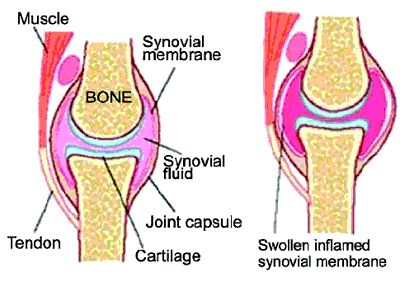| 2006 |

|
YEAR BOOK |
Carlow Institute of Technology
|
Arthritis: disease progression and angiogenesis
|

Rheumatoid Arthritis (RA) is a chronic progressive autoimmune disease characterized by progressive joint destruction. In RA, angiogenesis (new blood vessel formation) and persistent inflammatory cells are central in mediating bone destruction. This bone destruction is characterized by varying levels of inflammation in synovial tissue. These varying levels are reflected by alterations in the acute-phase response (APR), which is a nonspecific phenomenon that is induced by inflammation, infection, or tissue damage. The APR is exemplified by altered plasma concentrations of several proteins. One such protein is acute phase serum amyloid A (A-SAA). Acute-phase proteins play a critical role in our defense mechanisms. Serum levels of A-SAA in RA patients increases dramatically within hours following an inflammatory stimulus and can reach levels that are 1000-fold greater than normal. A-SAA correlates with disease progression. A-SAA mRNA is produced by fibroblast-like synoviocytes (FLS) and endothelial cells obtained from synovial tissue samples from the knee joints of patients with RA and other inflammatory arthropathies.
One of the earliest events in inflammation is angiogenesis, these new blood vessels then invade the synovium which results in a persistent infiltration of immune cells. The recruitment of these inflammatory cells into the joint is mediated by three families of adhesion molecules; the immunoglobulin superfamily, the selectins and the integrins. High levels of adhesion molecule expression are present in the inflamed joint. Once inflammatory cells enter the joint they release proinflammatory cytokines and growth factors which activate several pathways that are involved in cell survival, migration and degradation resulting in the destruction of the joint.
The research being undertaken in IT Carlow is in collaboration with Professor Barry Bresnihan and Dr Ursula Fearon, Dept of Rheumatology, St. Vincent's University Hospital (SVUH). The work is investigating the role A-SAA plays in the regulation of inflammation in RA by examining Focal adhesion kinase expression (which mediates integrin pathways) and integrin expression. These studies are carried out in inflamed synovium, endothelial cells (EC) and FLS obtained from arthritis sufferers in SVUH. Synovial tissue is also treated with various pro-inflammatory mediators to investigate if these mediators contribute to angiogenesis, inflammation and ultimately disease progression.
Contact: Dr Rosemary O'Hara,
Department of Science & Health,
Institute of Technology, Carlow.
Tel: 059-9176220
E-mail: [email protected]